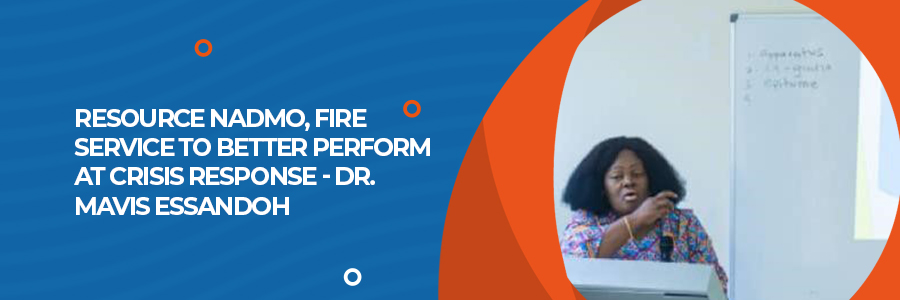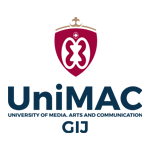
Dean of the Faculty of Public Relations, Advertising and Integrated Marketing at the Ghana Institute of Journalism (GIJ), Dr. Mavis Essandoh, has courted for more support to be advanced towards the Ghana National Fire Service (GNFS) and National Disaster Management Organization (NADMO) – two of the country’s crisis response organizations.
Her comment comes on the back of her presentation during the Institute’s Faculty Lecture Series on Friday, September 23 on the topic “Fighting ‘real’ fire? – a case study of two Ghanaian crises management organizations”.
Dr. Essandoh stated that although the two organizations were trying their best to deliver on their mandate, they were logistically constrained. As a result, Ghanaians generally hold the view that the organizations are not able to perform their duties satisfactorily per data gathered from the research.
The Senior Lecturer further noted that, crisis management was not solely the mandate of the two organizations but rather everyone had a key role to play.
“I think that they need to be resourced more in the management of crisis and disasters. We seem to be looking at just them, but it is a shared responsibility. Everybody has a role, the average Ghanaian, the stakeholders, the institutions, the government. We all have a stake in managing crisis and in supporting these two crisis response organizations,” she added.
Crisis response communication
Dr. Essandoh indicated that both organizations were engaged in more reactive communication than preventive forms of communication. She called on the two organizations to re-strategize their communication plan to serve the needs of Ghanaians who require more information in preventing or handling disasters.
“They have some form of communication procedures in place, but probably it was not enough. And given the recent spate of disasters, they need to re-strategize in communicating with the average Ghanaian. They may have to focus more of their efforts on pre-crisis communication rather than post crisis communication,” she remarked.
Advice
Dr. Essandoh further reiterated her call for more collaborative efforts in mitigating crisis and disasters. She maintained that like a chain of activities, the ineffectiveness of one part will have a negative impact on the eventual outcome.
“I think that it’s a collaborative effort. It’s like a chain of events. So, when one part is not functioning, it affects the entire structure. I think that it behooves on all of us – the institutions, the government, and the agencies themselves – to be more up to the task to manage the crisis and disasters in the country,” she said.
Participants
The Chairperson for the lecture, Prof. Eric Opoku-Mensah, Deputy Rector of GIJ in his remarks advised lecturers and students not to wait to have a full research paper to get their works onto the lecture series. He encouraged participants to feel free to present abstracts and other research ideas as the views of faculty and student participants could help shape those ideas into solid research works.
Various participants at the program applauded Dr. Mavis Esssandoh for her brilliant presentation. They expressed optimism that the findings and recommendations of her research will be implemented to make the two organizations effective.
“I think the presentation and the lecture has been a great one and I want to commend the presenter and the entire management of GIJ and the Directorate of Research, Innovation and Development (DRID) for organizing this important lecture. We look forward to having more” Mr. Yaw Gyau, an Advertising Lecturer said.
The research presentation was the third inter-faculty research seminar under the auspices of the Directorate of Research, Innovation and Development at GIJ.
By: Daniel Sackitey and Rebecca Owusuwaa Asante
